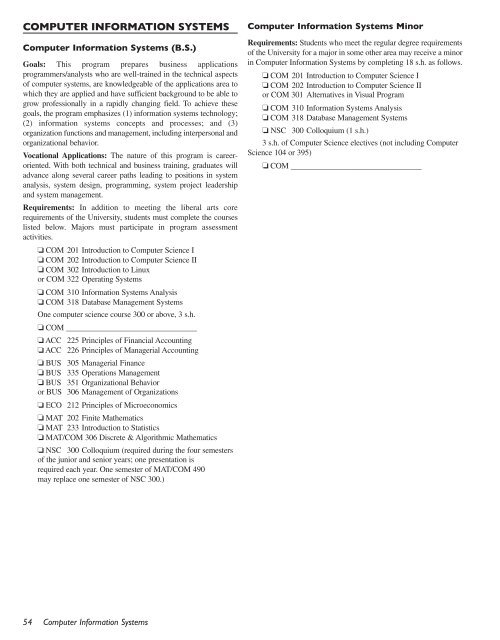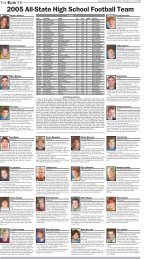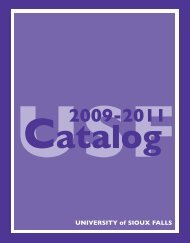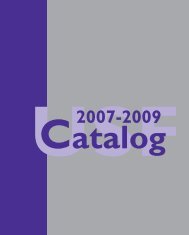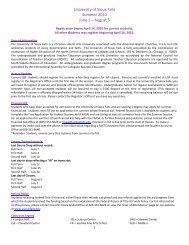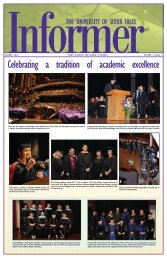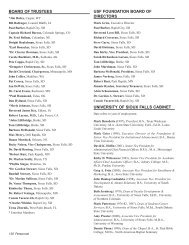USF TELEPHONE DIRECTORY - University of Sioux Falls
USF TELEPHONE DIRECTORY - University of Sioux Falls
USF TELEPHONE DIRECTORY - University of Sioux Falls
You also want an ePaper? Increase the reach of your titles
YUMPU automatically turns print PDFs into web optimized ePapers that Google loves.
COMPUTER INFORMATION SYSTEMS<br />
Computer Information Systems (B.S.)<br />
Goals: This program prepares business applications<br />
programmers/analysts who are well-trained in the technical aspects<br />
<strong>of</strong> computer systems, are knowledgeable <strong>of</strong> the applications area to<br />
which they are applied and have sufficient background to be able to<br />
grow pr<strong>of</strong>essionally in a rapidly changing field. To achieve these<br />
goals, the program emphasizes (1) information systems technology;<br />
(2) information systems concepts and processes; and (3)<br />
organization functions and management, including interpersonal and<br />
organizational behavior.<br />
Vocational Applications: The nature <strong>of</strong> this program is careeroriented.<br />
With both technical and business training, graduates will<br />
advance along several career paths leading to positions in system<br />
analysis, system design, programming, system project leadership<br />
and system management.<br />
Requirements: In addition to meeting the liberal arts core<br />
requirements <strong>of</strong> the <strong>University</strong>, students must complete the courses<br />
listed below. Majors must participate in program assessment<br />
activities.<br />
❏ COM 201 Introduction to Computer Science I<br />
❏ COM 202 Introduction to Computer Science II<br />
❏ COM 302 Introduction to Linux<br />
or COM 322 Operating Systems<br />
❏ COM 310 Information Systems Analysis<br />
❏ COM 318 Database Management Systems<br />
One computer science course 300 or above, 3 s.h.<br />
❏ COM _________________________________<br />
❏ ACC 225 Principles <strong>of</strong> Financial Accounting<br />
❏ ACC 226 Principles <strong>of</strong> Managerial Accounting<br />
❏ BUS 305 Managerial Finance<br />
❏ BUS 335 Operations Management<br />
❏ BUS 351 Organizational Behavior<br />
or BUS 306 Management <strong>of</strong> Organizations<br />
❏ ECO 212 Principles <strong>of</strong> Microeconomics<br />
❏ MAT 202 Finite Mathematics<br />
❏ MAT 233 Introduction to Statistics<br />
❏ MAT/COM 306 Discrete & Algorithmic Mathematics<br />
❏ NSC 300 Colloquium (required during the four semesters<br />
<strong>of</strong> the junior and senior years; one presentation is<br />
required each year. One semester <strong>of</strong> MAT/COM 490<br />
may replace one semester <strong>of</strong> NSC 300.)<br />
54 Computer Information Systems<br />
Computer Information Systems Minor<br />
Requirements: Students who meet the regular degree requirements<br />
<strong>of</strong> the <strong>University</strong> for a major in some other area may receive a minor<br />
in Computer Information Systems by completing 18 s.h. as follows.<br />
❏ COM 201 Introduction to Computer Science I<br />
❏ COM 202 Introduction to Computer Science II<br />
or COM 301 Alternatives in Visual Program<br />
❏ COM 310 Information Systems Analysis<br />
❏ COM 318 Database Management Systems<br />
❏ NSC 300 Colloquium (1 s.h.)<br />
3 s.h. <strong>of</strong> Computer Science electives (not including Computer<br />
Science 104 or 395)<br />
❏ COM _________________________________


